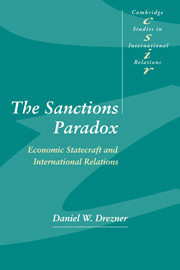Book contents
- Frontmatter
- Contents
- List of figures
- List of tables
- Acknowledgments
- 1 Introduction
- Part I Theory and data
- Part II Economic coercion in the former Soviet Union
- 5 Russian power and preferences
- 6 The extent of NIS concessions
- 7 Evaluating the evidence
- Part III Choosing between carrots and sticks
- Part IV Conclusion
- References
- Index
- Cambridge Studies in International Relations
7 - Evaluating the evidence
Published online by Cambridge University Press: 15 January 2010
- Frontmatter
- Contents
- List of figures
- List of tables
- Acknowledgments
- 1 Introduction
- Part I Theory and data
- Part II Economic coercion in the former Soviet Union
- 5 Russian power and preferences
- 6 The extent of NIS concessions
- 7 Evaluating the evidence
- Part III Choosing between carrots and sticks
- Part IV Conclusion
- References
- Index
- Cambridge Studies in International Relations
Summary
Introduction
Chapter 6 chronicled Russia's coercive interactions with the fourteen NIS during their first five years of independence. The case histories reveal thirty-nine distinct attempts to use coercion to extract concessions. This chapter evaluates how well the conflict expectations model predicts the variation in the attempts and outcomes of economic coercion.
Multivariate statistical analysis of these results would be incomplete. A sample of thirty-nine observations is a small one to rely only on statistical inference. Furthermore, the results allow for an alternative methodology. Statistical inference assumes that explanatory variables have mutually independent effects on the dependent variable. This overlooks the possibility that different combinations of these variables affect the outcome. For example, the statistical evidence in chapter 4 shows that the associated threat of military force or covert action, by itself, is not a significant factor affecting coercion outcomes. However, it may be a necessary part of a more complex causal pathway; if the target state is small and vulnerable to domestic discord, the threat of force may be a critical variable. In a world of complex causation, with a small set of observations, statistical inference is limited in its ability to control for interaction effects. For this, more supple techniques are needed. This chapter will use descriptive statistics and Boolean analysis to analyze Russian economic coercion.
Most of Russia's demands fell under five categories: basing rights, claims on old Soviet assets, treaty membership, treatment of ethnic Russians, and ownership stakes in strategic industries.
- Type
- Chapter
- Information
- The Sanctions ParadoxEconomic Statecraft and International Relations, pp. 231 - 248Publisher: Cambridge University PressPrint publication year: 1999

